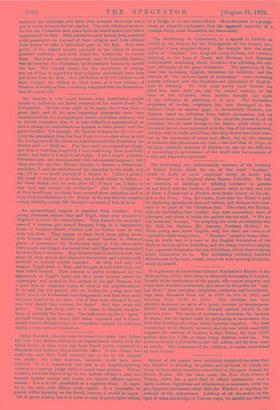The Archbishop of Canterbury, in a. speech at Carlisle on
behalf of the Society for the Propagation off the Gospel, pro- pounded a very singular theory. He thought that the great influx of " heathen " into England—sixty Indians, for instance, studying in the Inns of Court, and Burmese and Japanese Ambassadors wandering about London—was affecting_ the cur- rent philosophy of the great seminaries. The proximity of the East was increasing English toleration for infidelity, and the systems of "the extreme lands of heathenism" were exercising a great influence over the literature and philosophy of English- men of learning. Dr. Tait must surely have thrown his mind into some past era, say the second century, or the time of the Crusades, when Asiatic thought had much of the influence he attributes to it now. The destructive scepticism of to-day, scepticism like that developed in Mr. Galton's letter on another page, is distinctively Western, not Eastern, based on induotion from visible phenomena, not on induction from abstract thought. The scientific process is, of all processes, the one most foreign to the Asiatic mind, which is of all minds the one most saturated with the idea of the supernatural.. Atheists exist in India and China, but they do not base their athe- ism on the continuity of cause and effect, but on the absence of evidence that phenomena are real,—the root-idea of Maya, or the great atheistic doctrine of illusion—or else on the difficulty of reconciling the government of the world with the existence of a wise and benevolent governor.


































 Previous page
Previous page